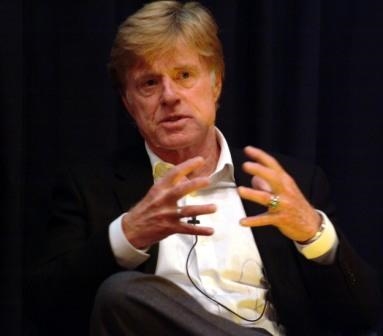 |
| Robert Redford at the Skoll World Forum (Greg Smolonski Photography) |
For more than 40 years, the actor and director Robert Redford has put his name, his reputation and his personal fortune on the line to fight for causes that he believes in: from environmental activism, and funding for the arts, to support for independent film.
Born in 1936 in Santa Monica, California, Redford grew up in a lower working class district in Los Angeles. The Redford family was one of the few Anglo families in a Hispanic neighborhood, but Redford says he was unaware of “class and caste distinctions” until the Second World War ended, and traditional prejudices re-asserted themselves.
“That led me to take a hard look at some of the slogans I was given as a kid,” Redford says. “One of them was, ‘It doesn’t matter whether you win or lose, but how you play the game.’ I realised that was a lie, because I was in sports, and I could see that my country cared very much about whether you won or lost.” Redford’s challenge to the emphasis placed on winning in the United States is expressed in the films Downhill Racer and The Candidate.
As his fame grew, Redford was increasingly able to trade on his success as an actor in order to influence the kinds of films he made. “The kinds of films I wanted to make,” he says, “were films that took a hard look at the society I was living in, the country I was living in, and the policies of that country.”
Redford’s political activism began around 1969 when he started to speak out about environmental issues. In the same year, with the financial proceeds of his acting success, Redford purchased a ski resort just outside Park City, Utah called Timphaven, and renamed it the Sundance Resort after his character in the film Butch Cassidy and the Sundance Kid.
It was here in 1980 that Redford founded the Sundance Institute, with the aim of enabling new voices to be heard in the film industry. At a time when Hollywood studios were increasingly focusing on “the bottom line” at the expense of experimentation, Redford created an environment where filmmakers could try new things and risk failing. “Independent film was DOA in those years,” he comments.
Redford’s support for the development of independent film led naturally to the creation of the Sundance Film Festival as a vehicle for exhibiting such films, and many well-known filmmakers, including Kevin Smith, Robert Rodriguez, Quentin Tarantino, James Wan and Jim Jarmusch had their big break at Sundance.
“Once we had survived the first few years,” Redford says, “we had a platform that we could use to launch ideas from and to start effecting change: for example, breaking down gender barriers, and breaking down racial barriers. Then we were able to push documentaries, which deserved a greater place in the marketplace than they were being given. Then, with money from George Soros, we were able to go international, bringing independent filmmakers from all over the world to the Sundance Festival, and thereby shifting to a more cultural exchange.”
One of the moments which Redford remembers with most pride involves just such a cultural exchange. “We brought a filmmaker from Palestine and a filmmaker from Israel to our documentary lab,” he recalls. “It was really risky, but they slowly broke down the barriers, and by the end of our lab they became friends and subsequently made a film together. That to me was a great achievement.”
Now, Redford says, there is a sea change occurring. New technology is creating new opportunities: i-pods and small screens provide the ideal platform for short films; and new categories of film are emerging on the big screen. “All we do is try to make sure that the films that get made and the films that get shown have something to do with sustainability – whether it’s cultural, environmental, or social,” Redford says. “It’s about the future. It’s about what’s going to be there tomorrow.”
Despite Redford’s achievements as an actor and director, and despite the phenomenal success of the Sundance Film Festival, which is now one of the premier showcases for independent film in the world, life is still not plain sailing. “Success has as much danger to it as failure,” says Redford. “It can tempt people away from the mission, particularly when money comes into it. When money comes along with success, it can really distort the mind. You’d better be pretty hard-minded to stay with it.”
Page created on 2/26/2007 10:33:20 AM
Last edited 2/24/2021 11:19:39 PM
